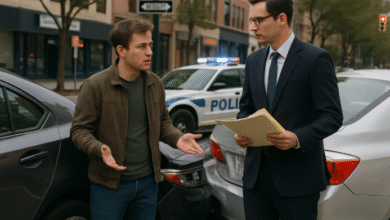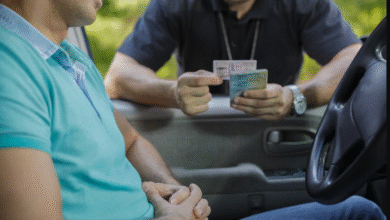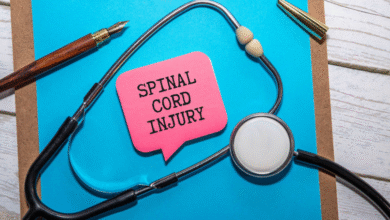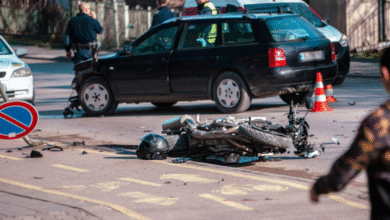What a Personal Injury Lawyer Does After a Car Accident in Kansas City

Car crashes are scary. The days after can feel worse. You’re hurt, confused, and unsure what to do next. That’s where a personal injury lawyer steps in. Call an experienced personal injury lawyer in Kansas City today. They help you get money for your pain, bills, and losses. If you’re in Kansas City, here’s what they do and why it matters.
Step 1: Free Meeting to Hear Your Story
First, a lawyer listens. They want to hear what happened, how it hurt you, and what your life looks like now. Most offer this first meeting for free. They don’t pressure you to sign anything.
They ask simple questions:
- Where did the crash happen?
- What injuries do you have?
- Did you miss work?
- Do you have medical bills?
You don’t need every detail. They help you figure it out.
Step 2: Investigate the Crash
Next, they get to work. They gather facts like police reports, witness statements, and photos of the crash. If needed, they may work with crash experts or visit the scene. They look for proof that the other driver was at fault. Kansas City uses “comparative fault” rules. This means if you’re partly at fault, your money may be reduced. They may also pull camera footage if available. In some areas, traffic or store cameras catch the crash. That can be strong proof.
Step 3: Handle the Insurance Companies
Insurance companies want to pay as little as they can. A lawyer makes sure they don’t trick or rush you. They deal with all calls and letters. If the other driver’s insurer calls you, just say, “Talk to my lawyer.” Your lawyer sends a demand letter. It says how much money you want and why. It includes:
- Medical records
- Bills
- Proof of lost work
- Pain and suffering
This starts the money talk. They also make sure your own insurance company treats you fairly. Some people have coverage they don’t even know about. The lawyer checks your full policy.
See also: The Role of a Probate Lawyer: A Guide to Navigating Estate Settlements
Step 4: Keep Track of Your Recovery
Your healing is key. The lawyer checks in on your treatment and records everything. That includes:
- Doctor visits
- Medications
- Physical therapy
- Mental health care
If you’re still in pain, they may wait to settle. Once you take money, you can’t ask for more. They may also ask your doctor for a report. This helps explain how long you’ll need care and what it may cost.
Step 5: Negotiate for a Fair Deal
Most cases settle before court. Your lawyer fights to get what’s fair. They go back and forth with the insurance company. You don’t have to talk to them at all. If the offer is too low, the lawyer says no. They explain your case again and ask for more. You always get the final say. A good lawyer won’t push you to take less than you need. They may also use past cases to show what your case is worth. This helps when the other side is being stingy.
Step 6: File a Lawsuit (If Needed)
Sometimes talks break down. That’s when your lawyer files a lawsuit. This is rare, but it shows you’re serious.
The steps include:
- Filing papers in court
- Taking depositions (interviews under oath)
- Attending hearings
They prepare for trial but still aim to settle. Most cases don’t go to court. A lawsuit can take longer. But it may be needed if the other side won’t be fair.
Step 7: Go to Trial (Only if You Must)
If the case goes to trial, the lawyer presents your story to a judge or jury. They explain:
- How the crash happened
- What it cost you
- Why the other driver is to blame
You may need to speak in court. Your lawyer gets you ready. They also bring in experts. Doctors may explain your injuries. Crash experts may explain how it happened. Trials take time and can be hard. But if that’s the only way to get justice, they’ll fight for you.
Step 8: Handle Your Money
When you win or settle, the lawyer helps with the money. They:
- Pay your medical bills from the payout
- Take their agreed fee
- Send you the rest
They may also help reduce bills so you keep more.
In Kansas City, many lawyers work on a “contingency fee.” That means they only get paid if you win. You may owe money to doctors or hospitals. Your lawyer talks with them to lower those costs.
Why Hiring a Kansas City Lawyer Helps
Local lawyers know the courts, judges, and insurance companies. They understand Missouri and Kansas laws. That’s a big help. They also know how much cases like yours are worth. That means better advice and more money in your pocket. Without one, you may take a low offer or miss a deadline. A local Skilled Kansas City Car Accident Lawyer also keeps things moving. Deadlines, court dates, and paperwork pile up fast. They handle all that for you.
What You Should Do After a Crash
Even before you call a lawyer, take these steps:
- Get medical care
- Take photos at the scene
- Get names of witnesses
- Call the police
- Don’t admit fault
Keep records of everything. Save bills, photos, and letters. They help your case.
Then, call a lawyer. The sooner, the better.
How Long You Have to File a Case
In Missouri, you have 5 years to file. In Kansas, it’s only 2 years. That time goes fast. A lawyer keeps you on track so you don’t miss your chance. They may also look at other deadlines. For example, if a city truck hit you, the deadline may be shorter.
Final Word
A crash can turn life upside down. A personal injury lawyer helps you in the legal process to get back on your feet. They take on the stress, so you can heal.
They know what to say and who to call. They don’t let the insurance company push you around.
If you’re hurt in Kansas City, don’t wait. Get help. Protect your rights. Get what you deserve.
FAQs About Car Accident Lawyers in Kansas City
1. Do I need a lawyer for a minor crash?
Yes, even small crashes can cause big problems. Hidden injuries and lost work add up fast.
2. How much does a personal injury lawyer cost?
Most work on a contingency fee. You pay nothing upfront. They take a cut only if you win.
3. How long will my case take?
It depends. Some settle in months. Others take a year or more if they go to court.
4. What if I was partly at fault?
In Missouri, you can still get money. Your share is reduced by your fault percentage.
5. What if the other driver has no insurance?
Your own insurance may cover you. A lawyer can help you file a claim against your policy.





